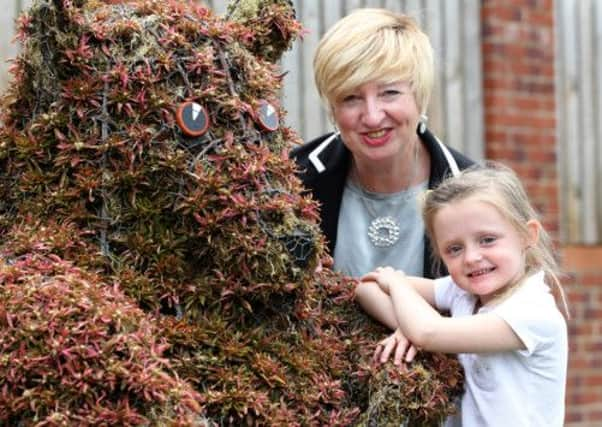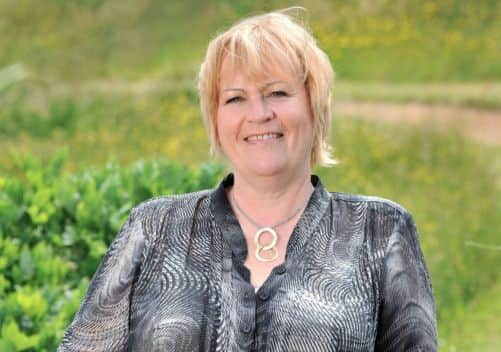Growing campaign to make Yorkshire a more green-fingered and pleasant land


When Sue Biggs looks back on her childhood, among the most vivid memories are the hours spent raking soil and tending plants in the back garden of the family home in Sheffield’s Broomhill.
The corner plot where she grew her runner beans was no more than a metre square and not all her harvests were bountiful, but it left a lasting impression on the woman who was appointed director-general of the Royal Horticultural Society in 2010.
Advertisement
Hide AdAdvertisement
Hide AdWhile not a gardener by profession – Sue had spent the previous 20 years working in the commercial travel industry – she never lost her childhood passion for plants and since she took up the post much of her time has been spent both banging the drum about the benefits a little more time spent in the great outdoors can bring and broadening the organisation’s remit beyond its high profile show gardens.


“I went back to the old family home a few years ago and was honestly shocked to see how small my little corner of the garden was,” she says. “In my imagination I had acres of land, but it shows just what you can do in even the smallest of spaces.
“Gardening has always given me so much pleasure and heading up the RHS was in many ways a dream job, but one thing I really wanted to do was to open it up to those who perhaps thought the organisation wasn’t for people like them.”
Much has been made of the impact on the nation’s health due to the loss of traditional cooking skills. According the RHS, it’s much the same story with gardening. A reliance on garden centres has meant the traditional planting calendar has been lost, with many now opting to buy pot plants in spring rather than cultivating their own from the autumn.
Advertisement
Hide AdAdvertisement
Hide AdAdded to that is the fact that in a fast-paced world where convenience is king many of us now lack both the patience to grow our own veg and the confidence to rely on harvesting our own crops of fruit and vegetables. It’s a trend the RHS is keen to reverse.
“We have lost a generation of gardeners,” admits Sue. “The reasons are many and varied and no one thing is to blame, but whereas Sundays once meant an afternoon in the garden, many 30 or 40-somethings now have no idea how simple it is to grow their own plants and that’s where the RHS comes in.
“I think perhaps in the past people thought the organisation was only for those who knew the Latin names of plants. It’s not and we have done a lot of work in the last few years to open our doors to many more people.”
The next step in that campaign is the launch of the Yorkshire in Bloom fund. In partnership with the Yorkshire Post, the RHS is giving away £100,000 over the next three years to projects which will directly boost community gardening across the county.
Advertisement
Hide AdAdvertisement
Hide AdThe scheme, the first of its kind in the county, is looking to provide numerous small grants of between £300 and £500 for groups in need of start-up funding alongside one flagship project in which it will invest up to £10,000.
“One of the things we want to show is that you can grow plants anywhere,” says Sue. “You don’t need acres of land, people can do amazing things with even the tiniest of balconies or window boxes and when communities get together the results can be incredible,” says Sue. “Under the Yorkshire in Bloom banner we’ve had people turn roundabouts into vegetable plots and seen areas of wasteland, once a dumping ground for all sorts of rubbish, transformed into really wonderful flower gardens.
“We know that there are a lot of people out there who have some great ideas and really want to do something for their community, but just need a bit of a helping hand. This is where we and this new funding stream comes in. We are looking for applications both from groups who could use a small amount of money to buy equipment to get them started to those who have really ambitious plans for their own community garden.”
The RHS chose Yorkshire for the launch of its pilot scheme partly because the county has already embraced Yorkshire in Bloom and seen success in the national Britain in Bloom competition and also because it’s home to the RHS garden Harlow Carr. Crucially, as well as being awarded grants, successful projects will also have access to expert advice and support through a new regional development team for Yorkshire and the Humber which is now based at the Harrogate gardens.
Advertisement
Hide AdAdvertisement
Hide Ad“We have already seen some amazing people doing some amazing things and that’s what we really want to capitalise on,” says Sue. “Gardening is such a great leveller. It doesn’t matter where you live or what job you do, gardeners are only interested in how well your plants grow.
“In a lot of places, the first reaction is to say, ‘Well there’s no point us doing something to make the area look better because it will only get vandalised’, but actually all the evidence we have shows that’s not the case.
“People find it much easier to vandalise a place which to them is anonymous. When they’ve seen someone investing time into an area, someone who they may well know, then levels of anti-social behaviour and incidents of graffiti often decline.”
Certainly that has been the experience of the Yorkshire in Bloom group in Kippax, near Leeds. Headed by Pat Samy, who also runs the local sweetshop, the group was set up in 2002 and last year won a gold award in the urban community category in the national Britain in Bloom awards.
Advertisement
Hide AdAdvertisement
Hide Ad“It’s given us a focus and it has helped to raise the profile of Kippax in a good way,” says Pat. “We don’t have much money, so the emphasis has always been on planting which is sustainable rather than just colourful hanging baskets. To be honest I didn’t have much experience of gardening, but the local headteacher at the time thought I’d be good at rallying the troops and here we are 13 years on.”
The community garden project, which has its own allotment, 40 planting beds and a wild flower garden, is run by a small group of volunteers. On Wednesday evenings and Sundays between 15 and 40 residents help with the weeding and planting, but the schemes has had a much wider impact on the local community.
“Someone who had emigrated to America from here came back to visit friends and family and they couldn’t believe how much the place had changed,” says Pat, who is already well on with this year’s planting scheme. “They said we’d made the streets look so good that house prices must have gone up.
“We’ve tried to involve as many people as we can, from the Methodist Church to the school, and I am a great believer that the environment you live in has an effect on your outlook. It must be better for you walking down the street and seeing flowerbeds than just concrete paving slabs.”
Advertisement
Hide AdAdvertisement
Hide AdIt’s a similar story at St George’s Crypt in Leeds, which last year won the RHS Britain in Bloom Young People’s Awards. Those who stay at the homeless charity are expected to share in the work of running the hostel, either in the kitchens or maintaining the grounds. It means that St George’s now boasts an impressive outdoor space and chief executive Chris Fields believes that gardening can play a vital role in the rehabilitation of those who have battled drug addiction.
“I don’t believe in the PlayStation and pool table culture. Getting back to nature really suits certain individuals who wouldn’t benefit from sitting in a room with a group of people talking about their problems,” says. “For addicts especially it can be helpful because they can measure their progress against the growth of plants and the passing of the seasons.”
The RHS Yorkshire in Bloom fund is now open for applications and the organisation hopes it will just be the start of a major community garden revival.
“This is a real opportunity for people not just to make a lasting impact on the places where they live,” says Sue, who previously worked for travel companies Kuoni and Thomas Cook. “But to discover the joy of not only having a little green space on their doorstep, but having had a hand in making it flourish.”
Readers will judge winner
Advertisement
Hide AdAdvertisement
Hide AdOver the next three years the RHS Yorkshire in Bloom fund will give away £100,000 to support grassroots gardening projects, along with advice and support.
Small grants of between £300 and £500 are available for groups that require start-up funding and each year the organisation is also looking to invest up to £10,000 in a larger project.
A panel of judges will choose the two best large project proposals, with the ultimate winner being decided in April by Yorkshire Post readers.
The deadline for all applications to the grant programme is March 15.
To find out more and to download an entry form visit rhs.org.uk/rhs-yorkshire-in-bloom-community-fund